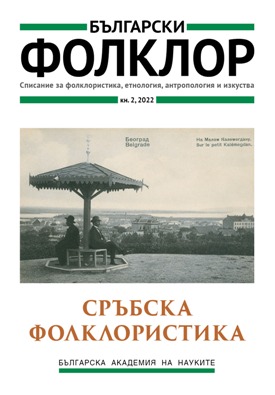Диалектолог, етнограф, писател: стратегии за вторична текстуализация на народните приказки в Етнографската сбирка на Архива на Сръбската академия на науките и изкуствата до 1914 година
Dialectologist, Ethnographer, Writer: Strategies of Secondary Textualization of Folk Tales in the Ethnographic Collection of the Archives of the Serbian Academy of Sciences and Arts Until 1914
Author(s): Marina Mladenović MitrovićSubject(s): History, Anthropology, Social Sciences, Language and Literature Studies, Literary Texts, Cultural history, Museology & Heritage Studies, Customs / Folklore, General Reference Works, Library and Information Science, Archiving, Cataloguing, Classification, Preservation, Electronic information storage and retrieval, Anthology, Applied Linguistics, Studies of Literature, Sociology, Ethnohistory, History of ideas, Local History / Microhistory, Oral history, Social history, Sociolinguistics, Serbian Literature, Cultural Anthropology / Ethnology, Culture and social structure , Sociology of Culture, Sociology of the arts, business, education, Philology, Social Norms / Social Control, Source Material, Identity of Collectives, Stylistics
Published by: Институт за етнология и фолклористика с Етнографски музей при БАН
Keywords: ethnographic collection; archives of the Serbian Academy of Sciences and Arts; secondary textualization; dialectologist; ethnographer; writer
Summary/Abstract: The Ethnographic Collection, today a part of SASA Archives, was initiated by Stojan Novaković in order to continue Vuk Karadžić’s work on collecting folklore. The goal of the Academy was to get the material collected, systematized and published, and the task of collecting was entrusted to individuals, such as teachers and priests, who lived among the people and were literate enough to record various forms of folklore. The questionnaires they used were intended for ethnographic and anthropogeographic research, which means that there were no clear instructions for recording folk tales. In this paper, I use the term textualization (after Lauri Honko), defined here as secondary, because it refers to the representation of the written (rather than spontaneous oral) text, in order to point out different models/strategies of recording folk tales used by collectors in the last decades of the 19th and first decades of the 20th century. Depending on their position, recording of the folklore material was sometimes influenced by ethnography or dialectology, considering that the mentioned disciplines were on their rise, while the literary model appears as a regional distinction.
Journal: Български фолклор
- Issue Year: XLVIII/2022
- Issue No: 2
- Page Range: 229-249
- Page Count: 21
- Language: Bulgarian
- Content File-PDF

